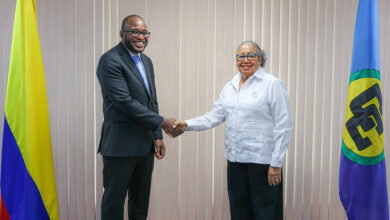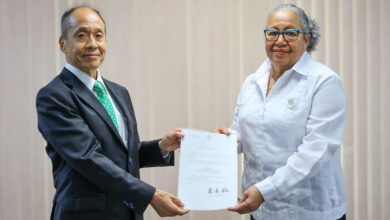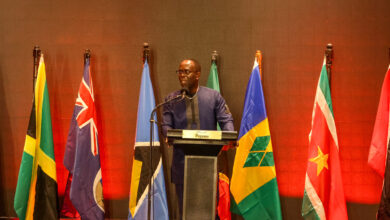Colleague Ministers
Secretary-General
Distinguished Delegates
Members of the Media
Ladies and Gentlemen
It is with great pleasure that I welcome my distinguished Colleague Ministers of Foreign Affairs and their delegations to the shores of Trinidad and Tobago as we convene the Third Meeting of the Council for Foreign and Community Relations (COFCOR). Ladies and Gentlemen, the Third COFCOR is being convened at an important juncture in our Region’s development and in the aftermath of a watershed year during which we have enjoyed some degree of success on the regional and international stages.
Featuring prominently as one of the Region’s foreign policy successes is the outcome on February 3 this year of the lengthy negotiations between the countries of the African, Caribbean and Pacific Group (ACP) and the European Union for a Successor Agreement to the Lome IV Convention. Caribbean leaders of the Trade Negotiating Group and the Central Negotiating Group have made a sterling contribution to the outcome of the discussions which has veered considerably from that originally contemplated in the European Commission’s Green Paper. We can be justifiably proud of this achievement and it would be remiss of me if I did not seek to honourably mention the tireless labour of the Region’s diplomatic representatives in Brussels, in our capitals and the technical guidance and coordination of the Regional Negotiating Machinery. The framework Agreement for a Successor Convention with its “roll-over” of the present Lome Trade Regime will ensure that our countries have a reasonable period within which to address the thrust of their economic policies with a view to developing a culture of competitiveness.
Honourable Colleagues, we are also presented with the opportunity to discuss the unfortunate stance adopted by Panama in respect of the agreement reached at the conclusion of the first phase of the post-Lome negotiations.
At our Second Meeting with the US Secretary of State Madeline Albright in March, the Region expressed its appreciation to the US for the softening of the position formally adopted by the US Trade Representative (USTR) which has informally indicated acceptance of the Caribbean’ proposals for a settlement of the EU Banana Regime dispute. The prospects for the CBI Enhancement legislation are very good and the US approach to granting of the WTO waiver is positive and helpful.
Communication from Secretary Albright since our March meeting revealed that the US government has heard our concerns about treatment of the CARICOM region by multilateral institutions such as the Organisation for Economic Cooperation and Development (OECD) and Financial Action Task Force (FTAF). The Secretary has termed our concerns “legitimate” and has promised to press for a proper hearing of our concerns. Distinguished Colleagues, our efforts have not been in vain. In our deliberations today, we must examine the strides made in the interaction with the Clinton administration and put measures in place to ensure similar or improved linkages with the new administration following US elections later this year.
The conclusion of negotiations with the Dominican Republic for a CARICOM/Dominican Free Trade Agreement through dint of intense technical work and negotiations is again an achievement of which we can be justifiably proud as we implement the recommendations of the West Indian Commission’s Time for Action in expanding our linkages with the Region’s Latin American neighbours. Work is ongoing on the development of a Trade Development Agreement with the Republic of Cuba which had its genesis in the Joint Commission mechanism which CARICOM has established with that country.
Within the last twelve months, the importance of high level consultation was underscored with the convening of several Summits of Heads of State and/or Government among which were the Inaugural European Union – Latin America and the Caribbean Summit, the Commonwealth Heads of Government Meeting, the first Franco-Caribbean Summit and the South Summit of the Group of 77 which was held just last month in Havana, Cuba which CARICOM was well represented.
The renewed interest in the Caribbean by Spain and France for stronger relations accompanied by offers of technical assistance and cooperation must be assiduously pursued in recognition of our strategy to forge closer alliances with key players in the global arena. The onus is also on us, Distinguished Colleagues, to chart the course of our relations with these countries and determine the nature of the assistance and cooperation needed in terms of the resources of the Region and its absorptive capacity. Not every offer has to be accepted, yet a thorough analysis guided by policy decisions must ensure that all opportunities for development are taken.
Our imminent discussions with the United Kingdom Foreign Secretary will provide yet another major occasion for not only deepening our alliance with this country with which the majority of our members have had traditional linkages, but also for presenting the Region’s views on issues that are critical to the socio-economic development of our respective countries. We cannot dismiss the opportunity to dialogue with the united Kingdom or any other country on matters of trade and investment, the OECD Harmful Tax Initiative, post Lome IV arrangements, human resource development and the shipment of nuclear waste, to name just a few of the major areas which we will discuss with Foreign Secretary Cook later this week. In this vein we welcome the opportunity to engage in dialogue on matters pertaining to the internal security of our countries and the deleterious effect of drug trafficking, gun running and the deportation of criminals on the social and cultural fabric of our societies. Ladies and Gentlemen, the relevant authorities in Trinidad and Tobago have noted the vast majority of socially displaced people are deportees. This is indeed a worrisome situation as they are now prey of individuals or organisations willing to recruit their specific talent.
Distinguished Foreign Ministers, in charting the course for the Region’s foreign policy initiatives, we must continue to grapple with the phenomenon of globalisation which through trade, capital flows and advances in technology has had a significant impact on domestic economies as well as multinational relations. Countries are beginning to evaluate those effects after the first five years of experience under the new trade rules in the multilateral trading system and in the aftermath of the Asian financial crisis.
Whilst acknowledging the windows of opportunity which arise from the pursuit of more liberal economic policies, empirical records have shown that the income gap between developed and developing countries is widening. Globalisation has increased the vulnerabilities of many countries of the South and has resulted in the marginalisation of the two thirds of the world’s population.
We have a responsibility to our peoples, to join hands with like-minded countries and regions to ensure that the international economic system takes into account our special needs and interests. This ought to be a major foreign policy objective of CARICOM. We need to ensure that the developmental dimension is fully taken into account in any new round of multilateral trade negotiations. We must continue to call for an international economic system that is equitable, transparent, inclusive, participating and broad-based. We must keep our focus on poverty eradication, improvements in health, education and social conditions in developing countries, as well as the promotion of growth with equity and insist that these be given high priority on the multilateral agenda. We must be alert and proactive and capable of challenging those policies of the industrialised world which adversely affect our country. We can and have already challenged the OECD action taken against Caribbean countries with off-shore financial centres. I was pleased to read a report in the “Times” of London accepting the suggestion that the OECD has now retreated on this matter. The battle is not over however, and we must continue to be alert on this and all other matters. The fact is we can succeed with concerted effort.
We in CARICOM led the way in the Commonwealth initiative to deal with the small, vulnerable States of the world. An initiative which is on-going and which is bound to reap rewards. We played a significant role as well in the South Summit which passed a resolution requesting that the countries of the South be represented in any group or forum, deliberating and deciding on social, economic and political matters which can affect adversely or otherwise those countries of the South. In other words, we are calling for institutionalising North-South dialogue and we have established the South Coordinating Commission to further this goal. A major aspect of our foreign policy concerns is to ensure that those fundamental initiatives do not flounder. Part of our solution lies in being in good company.
In conclusion, distinguished colleagues and delegates, I wish you a productive and enjoyable stay in Trinidad and Tobago.
I thank you.





